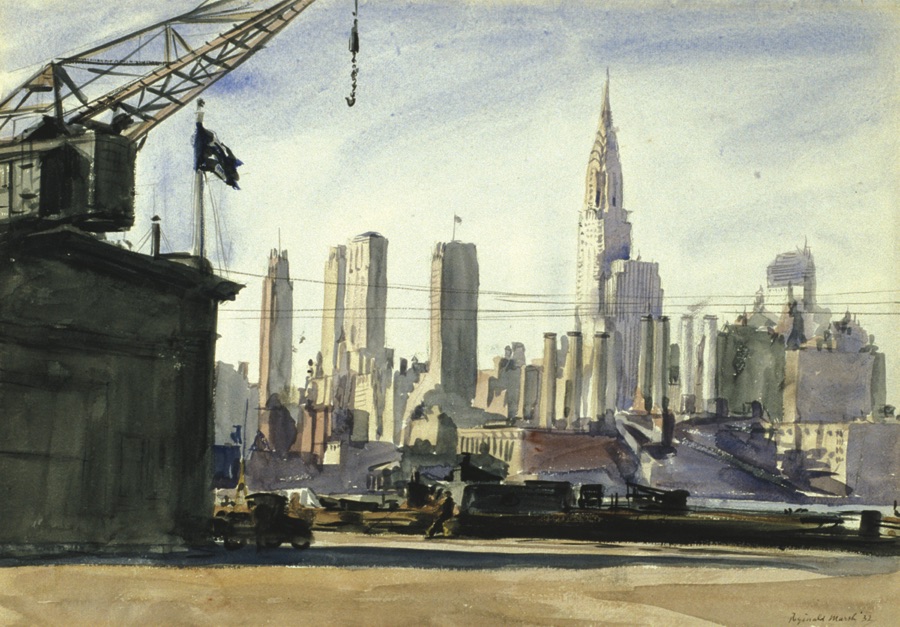The Hillstrom Museum of Art presents concurrent exhibitions: Contemporary American Painting [1945]: Selections from the Hillstrom Museum of Art, Gustavus Adolphus College, and the Perlman Teaching Museum, Carleton College, and FOCUS IN/ON: Reginald Marsh’s Manhattan Towers, both on view September 18 through November 5.
The museum hosts an opening reception from 7:00 to 9:00 p.m. on September 18, featuring a gallery talk by Laurel Bradley, former director of the Perlman Teaching Museum and Donald Myers, director of the Hillstrom Museum of Art. In addition, there will be a Nobel Conference reception from 6:00 to 8:00 p.m. on October 3.
Contemporary American Painting [1945]
In 1945, the Encyclopedia Britannica staged a sweeping examination of contemporary American painting from its art collection. An exemplary work by each of over 100 well-respected artists toured the United States, providing cultural access and aesthetic experiences to large numbers of everyday Americans.
This current exhibit, titled Contemporary American Painting [1945], is a collaborative exhibition of the Hillstrom Museum of Art, Gustavus Adolphus College, and the Perlman Teaching Museum at Carleton College in Northfield, Minnesota. It seeks to recapture the essence of the original Contemporary American Painting exhibition with paintings, drawings, and prints chosen from the collections of the Hillstrom Museum of Art and the Perlman Teaching Museum.
Works donated by Gustavus alumnus Richard L. Hillstrom, a savvy collector and patron of the arts, anchor Gustavus’ selections. Carleton’s contributions draw on donations by William Benton, an alumnus who served as the chairman of the board and publisher of Britannica. All of the artists featured in this exhibition were either represented in the Encyclopedia Britannica collection or had close relationships with those painters.
Contemporary American Painting [1945] features works of the revolutionary Ashcan School by artists including John Sloan (1871-1951), William Glackens (1870-1938), and George Bellows (1882-1925). Regionalism, renowned for its depictions of Americana, especially in the rural Midwest, is represented by the works of Thomas Hart Benton (1889-1975), John Steuart Curry (1897-1946), and Grant Wood (1891-1942). Also represented are Urban Realists such as Reginald Marsh (1898-1954) and Paul Cadmus (1904-1999), and American Scene artists including Charles Burchfield (1893-1967). Six paintings from the original Encyclopedia Britannica collection, including Tomorrow and Tomorrow (1939) by Fletcher Martin (1904-1979) and Orderly Retreat (1943) by Phillip Evergood (1901-1973), unite the past and current exhibitions.
Contemporary American Painting [1945] is accompanied by a fully illustrated catalogue, available free of charge to visitors. The exhibition will also be shown at the Perlman Teaching Museum January 5 through March 12, 2018.
FOCUS IN/ON: Reginald Marsh’s Manhattan Towers
FOCUS IN/ON: Reginald Marsh’s Manhattan Towers is another of the Museum’s FOCUS IN/ON projects, in which a single work from the Hillstrom Collection is analyzed in depth in collaboration with a colleague from across the Gustavus Adolphus College curriculum. Manhattan Towers (1932), a watercolor by American artist Reginald Marsh (1898-1954), is considered in an essay co-written by Elizabeth Jenner, associate professor and chair in sociology and anthropology and associate professor in gender, women, and sexuality studies, and Hillstrom Museum of Art director Donald Myers. The project explores artist Marsh, his career, his interest in skyscrapers, and his group of images of the skyline of New York City. It also considers skyscrapers and skylines from a sociological point of view, including their iconic and emblematic nature as a part of a person’s identity and identification with place of residence.
Both exhibits are accompanied by an illustrated brochure available free of charge to visitors.
As with all the programs of the Hillstrom Museum of Art, these exhibitions, their receptions, and the gallery talk by Laurel Bradley and Donald Myers are open to the public and are free of charge.
Further information can be found at gustavus.edu/hillstrom.

Leave a Reply
You must be logged in to post a comment.